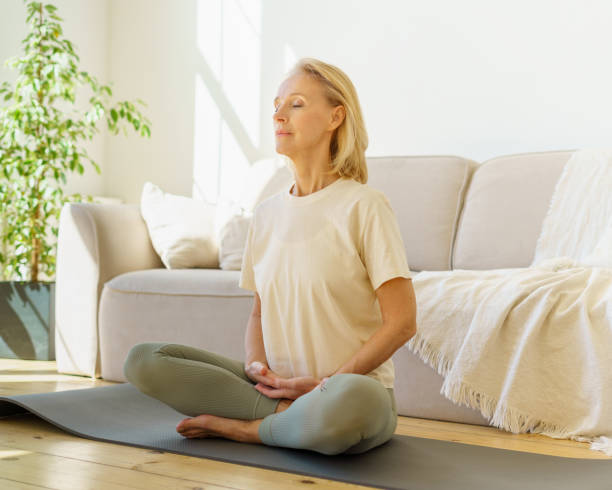|
You know that moment when everything feels like too much? You’re so stressed about work, school, friends and everything else that you just can’t take it any longer. Suddenly all of those little things that would usually go unnoticed start to drive you crazy. You feel like your head is going to explode from the pressure of it all and, at the end of the day, nothing seems to help. Even if you try meditation, reading a book or listening to music, everything goes back to normal after a while. Regardless of what methods you use to relax and unwind — whether they are active or passive — sooner or later stress is going to creep back in again. That’s why we want to introduce you to a breathing exercise for stress relief that is simple enough for beginners but will also challenge those who practice it on a regular basis.
What is the Breathing Exercise for Stress Relief? The breathing exercise for stress relief is a method of breathing that is used for relaxation and meditation. It is easy for beginners to learn and can be done anywhere at any time. The purpose of this exercise is to calm your body and reduce stress by focusing on your breathing. When you practice breathing exercises for stress relief, you are taking control over your mind and body. This means that you are now in charge of your thoughts and feelings, instead of vice versa. With this exercise, you will learn how to breathe from your diaphragm, which is the main source of oxygen for your body. Your diaphragm is located right below your lungs and is responsible for pushing air into your lungs. The breathing exercise for stress relief will teach you how to breathe deeply and rhythmically. The benefits of this practice include reduced stress, improved focus, and better sleep! You can also use this breathing technique when you're feeling anxious or are experiencing intense emotions. The breathing exercise for stress relief is one of the most basic and effective relaxation techniques. How to Practice The Breathing Exercise for Stress Relief
Why This Breathing Exercise is so Effective The breathing exercise for stress relief is effective because it is something that you can do no matter where you are and with little to no effort. You don’t need any special equipment or any other person to practice it. All you need is you and a minute of your time. Because it is such an easy exercise to do, it means that you can do it almost anywhere and at any time. If you have five minutes to spare throughout the day, you can fit in this quick session of breathing to help you relax. Because your breath is something that is always with you, you don’t need anything extra to help you unwind. This is one of the reasons why this exercise is so effective. Tips to Help You Start Using This Exercise Right Away!
Expert-Recommended Exercises for Stress Relief
The breathing exercise for stress relief is one of the most basic and effective relaxation techniques. It is something that you can do no matter where you are and with little to no effort. All you need is you and a minute of your time. The breathing exercise for stress relief is effective because it is something that you can do no matter where you are and with little to no effort. You don’t need any special equipment or any other person to practice it. All you need is you and a minute of your time. Because it is such an easy exercise to do, it means that you can do it almost anywhere and at any time. If you have five minutes to spare throughout the day, you can fit in this quick session of breathing to help you relax. Because your breath is something that is always with you, you don’t need anything extra to help you unwind. This is one of the reasons why this exercise is so effective.
0 Comments
Stress is a normal part of life. It can be a positive force that drives us to excel and meet challenges head-on. When stress becomes the norm, however, it ceases to be helpful. In fact, persistent stress has been shown to have negative effects on our physical and mental health. What’s more, long-term stress can cause some serious problems in your personal life and career. If you’re ready to break free from the shackles of chronic stress, check out these 8 tips for living a stress-free life.
Go on a digital detox. When we’re feeling stressed out, it’s tempting to dive headfirst into our social feeds. This may offer some short-term relief, but it’s a poor long-term solution. Research suggests that spending too much time on your digital devices can lead to anxiety and depression. It can also negatively impact your sleep, which is essential for managing stress. So, make a conscious effort to reduce the time you spend on social media and other digital activities. Avoid checking your feeds first thing in the morning and at night, and use an app like Cold Turkey to help you kick the habit. If you’re feeling stressed, take a few days to detox from your devices. You’ll likely find that you feel less anxious and more at peace as a result. Exercise regularly. Regular exercise has been shown to reduce anxiety and depression, improve sleep, and manage stress. It may even reduce the risk of developing chronic diseases such as coronary artery disease and type 2 diabetes. Choose an exercise that you enjoy, whether it’s running, yoga, or climbing. If you’re new to exercise, start slow and don’t overdo it. Make sure to get your doctor’s approval before you begin an exercise program. Once you’re cleared, aim to incorporate exercise into your life on a daily basis. You don’t need to spend hours at the gym. Even a 10-minute walk can have a positive effect on your health and mood. Make healthy food choices. Our daily diet has a significant impact on our mood and ability to cope with stress. Eating plenty of fresh fruits and vegetables and whole grains has been shown to reduce anxiety and improve mood. Meanwhile, eating a diet rich in processed foods can increase the risk of developing stress-related health issues. If you struggle with unhealthy eating habits, seek out support from a dietician. They can help you create a personalized eating plan to help you meet your health and nutrition goals. If you’re pressed for time, try stocking your kitchen with healthy snacks and meals that are easy to prepare. This is especially important if you live alone and don’t have anyone to help you stick to a healthy diet. Cultivate friendships and relationships. Humans are social creatures, and our relationships with friends, family members, and significant others can be very helpful in managing stress and anxiety. Regularly connecting with loved ones has been shown to reduce stress and improve physical and mental health. If you’re feeling overwhelmed by life, try reaching out to someone close to you. You can also consider joining a local support group to meet new people who are going through similar situations as you. Develop coping strategies. Now, it’s crucial to note that stress isn’t always a bad thing. In fact, it can be a positive force that helps us excel and meet challenges head-on. The key is to learn to recognise your stress triggers and employ coping strategies to manage your daily pressure. Practising mindfulness and breathing exercises are two excellent ways to manage stress. They’ve been shown to reduce anxiety and improve mood. If you’re feeling overwhelmed, try taking a few minutes to sit in silence, close your eyes, and focus on your breathing. You can also try journaling or meditating with an app such as Calm or Insight Timer. Set boundaries and say no. Chronic stress often stems from taking on too many responsibilities at once. It may come in the form of extra work, too many relationships, or commitments that are weighing you down. Push yourself to meet your obligations, but don’t go overboard. Be sure to set boundaries and say no when you need to. You should also consider delegating tasks when possible. This will help reduce your stress, free up your time, and help you feel better about yourself. If you’re feeling overwhelmed, try these three steps to help you reset, regroup, and get back on track. Travel and take time to reset. Travel is not only a great way to bond with your loved ones, but it’s also a great way to relieve stress. The new sights, sounds, and experiences that you encounter on vacation can help you break away from your usual worries and concerns. Those who travel frequently have a lower risk of developing stress-related health issues, such as heart disease. If you can swing it, try to take at least one vacation each year. If you can’t afford to travel, you can still benefit from taking time off. Try to avoid bringing work home with you and unplugging from your daily responsibilities. Even a week off work can have a significant effect on your stress levels. Develop rituals-be mindful and be present. This is something a lot of people are turning to these days as a coping mechanism. Having a routine that you follow each day can help you feel more in control of your life and reduce your stress levels. Make sure to incorporate activities you enjoy such as reading, exercising, and meditating. Creating specific routines can help you reduce anxiety, increase your productivity, and even improve your sleep. The more you practice these rituals, the easier it will be to shake off the stress of everyday life. Stress is a normal part of life, but it can become a serious problem when it’s chronic. It can also lead to health issues such as anxiety, depression, insomnia, and weight gain. To combat stress, it’s important to reduce your daily load and develop healthy habits. You can also try relaxation and mindfulness techniques to help reduce stress and anxiety. If you’re feeling overwhelmed, try some of these tips for living a more stress-free life. Stress is a part of life. But when stress becomes overwhelming, it can wreak havoc on your physical and mental health. According to the American Psychological Association, almost half of all Americans report living with high levels of stress on an ongoing basis, and the consequences can be devastating: chronic stressors have been linked to increased risk for heart disease, depression, eating disorders, and more. Perhaps you find yourself in a situation that’s filled with stress so often that it affects your day-to-day life. Maybe you spend long hours at work or school and not enough time relaxing. Stress has many sources—but you don’t have to let stress control your life. By identifying the triggers of your stress and taking small steps to manage them, you can take the stress out of your day and keep your brain healthy.
Identify the sources of your stress Before you can get to the root of your stress, you need to clearly identify the sources of it. Some common stressors include job or financial pressures, relationship concerns, health issues, family obligations, and educational demands. You may notice that some sources of stress are temporary, while others are more long-term. Either way, you might benefit from rethinking the way you approach these stressors. You can try implementing cognitive behavioral therapy or mindfulness techniques to make your stressors more manageable. Develop a routine One of the most effective ways to reduce stress in your life is to create a routine. A routine is a series of activities that are regularly scheduled, and it can help you feel more in control of your day. A busy schedule can cause a lot of stress for many people, but having a routine set up can help to lessen that. You can have a routine that is as simple as getting up at the same time each day, eating the same type of breakfast each morning, or taking the same path to and from work. Simply having a routine can make you feel more in control, which can reduce your stress level. A routine doesn’t have to be something super strict. You can pick and choose what parts of your daily activities to make part of a routine and which to leave flexible. For example, you might decide that every morning you’re going to eat breakfast, do some light stretching, and then read your favorite book for 15 minutes before getting ready for work. Find ways to relax While each person’s stress-relieving techniques may vary, one thing is certain—most stress-reducing activities are beneficial for both your body and mind. Some examples of relaxation techniques include deep breathing, guided imagery, yoga, tai chi, meditation, and reading. Deep Breathing: When you’re stressed, your breath is often very shallow, which can make you feel even more tense and anxious. Deep breathing is an excellent way to slow down and relax when you’re feeling anxious or stressed. Guided Imagery: This is a type of visualization in which you picture yourself in a calm, peaceful place. Many people use this technique while they’re in a relaxed state to help them fall asleep at night, especially if they have trouble calming their mind enough to fall asleep. Yoga, tai chi, meditation, and reading
Take care of your body Your body and brain are connected, so when you’re not taking care of your body, you’re not taking care of your brain. Taking good care of yourself is essential to combat stress and other mental health issues. It’s important to get enough sleep, eat a balanced diet, and exercise regularly to keep your body in good shape. In addition to the above, you should also practice good self-care, which means setting aside time to do things that make you feel good, relaxed, and happy. This might include going for a walk, reading a book, or taking a bubble bath. Spending time each day doing activities you enjoy can help reduce stress and give you a much-needed break. Stress is inevitable in life, but you don’t have to let it take over your life. By identifying the sources of your stress and taking small steps to manage them, you can take the stress out of your day and keep your brain healthy. Remember, there’s a difference between being challenged and being overwhelmed. If you find yourself experiencing too much stress, it’s important to seek help and support. Stress is not always a bad thing. In fact, stress can be extremely helpful and have positive effects on your life. It can spur you to take action and achieve goals you wouldn’t normally be able to reach. Stress also has a measurable effect on the human brain. When stress is frequent and prolonged, it can shrink areas of the brain that are responsible for memory and learning, as well as cause a loss in volume in the hippocampus. But what exactly does this mean? How does stress actually affect our brains? And how do we prevent these effects? In this article, we will explore how stress affects your brain – keeping in mind that while stress isn’t always good, neither is avoiding stress when it’s necessary.
What is Stress? Stress is a physiological and psychological response to any demand on your body or mind. When people think of stress, they often think of negative emotions like anxiety and fear, but these are simply symptoms of stress. Stress can be caused by both positive and negative events, including work, exercise, and even relationships. Stress can have both short-term and long-term effects on the body, depending on the situation and the person. When someone is facing a stressful situation, their body releases hormones, such as cortisol, to help them deal with that situation. This is called the stress response. When the stressful situation ends, the body’s natural rhythms return to normal. Short-Term and Long-Term Stress Short-term stress is beneficial because it helps us avoid threats and gain advantages that can help us survive. This type of stress helps us perform better and achieve our goals when we need to “push through” and get things done. This can be seen in athletes, musicians, and other types of performers who need to put everything they’ve got into achieving a goal. Long-term stress is different. When the stress response is activated on a regular basis, it can be harmful to your body and lead to serious health problems. This can also affect your brain and cause cognitive impairment. How Does Stress Affect Your Brain? Stress can cause your brain to shrink and lose volume, particularly in the areas responsible for memory and learning. People who experience high levels of stress have been shown to have smaller hippocampi – the part of the brain that regulates emotions, mood, and memory. Researchers found that the brains of people who experience ongoing and long-term stress are different than people who are not stressed. Stress actually shrinks your hippocampus, the part of your brain responsible for learning and memory. This can have a significant impact on your life, affecting your ability to learn new skills or retain information. In addition, high levels of stress can also lead to depression and anxiety. The Dark Side of Stress: Depression and Anxiety Stress can also cause depression, which is marked by feelings of sadness, hopelessness, and even thoughts of suicide. Research on animals has shown that extended exposure to high levels of cortisol can lead to depression. While it is unclear whether this is also true in humans, it is possible that chronic stress causes changes in the levels of serotonin, dopamine, and other neurotransmitters that are responsible for regulating mood. Not only does stress lead to feelings of sadness and anxiety; it can also cause feelings of anxiety. When you’re stressed, you may feel a surge of adrenaline, which can lead to feelings of panic and a racing heart. If you are experiencing extreme levels of stress on a regular basis, you may be suffering from a disorder called generalized anxiety disorder. This can cause irrational fears and has been linked to smaller hippocampi in humans. Helping Your Brain Recover From Stress Fortunately, your brain is highly adaptable and is able to recover from some of these effects. However, this requires a period of relaxation without any additional stressors. The best way to prevent the negative effects of stress on your brain is to avoid chronic stress. Regularly practicing relaxation techniques, like yoga, meditation, or exercise, can help reduce stress and improve your overall health. Other strategies you can use to reduce stress include getting enough sleep, eating a healthy diet that is rich in vitamins and minerals, and surrounding yourself with positive people. Avoiding or reducing sources of stress in your life as much as possible is the best way to protect your brain from its harmful effects. Stress is a part of everyday life, and it’s important to manage it effectively. You can’t completely eliminate stress, but you can learn how to respond to it in a healthy way. Fortunately, there are many ways to reduce stress, from getting enough sleep to exercising regularly. By reducing stress, you can help protect your brain from its harmful effects. If you find yourself feeling stressed out, it’s important to take action to reduce your levels of stress. Doing so will not only help you feel better, but it can also protect your brain from the harmful effects of stress. Reducing stress is a lot easier said than done. However, with the right habits and techniques, it’s possible to find relief from stress as often as you need it. In fact, studies show that individuals who discover stress-relieving activities and habits feel less stressed over time. A little bit of stress can be good for you—it helps you meet deadlines and accomplish goals faster. But prolonged and unaddressed stress has a negative impact on your physical and mental health, leading to anxiety, depression, weight gain, fatigue, insomnia, headaches, and more. These effects are known collectively as ‘the stress response’ because they are triggered when your body responds to stressful situations. With this in mind, here are seven ways you can reduce stress today:
Breathe deeply When you are stressed, your breathing becomes shallow, which also triggers a fight-or-flight response in your body. Deep breathing, on the other hand, can help you relax and reduce stress as well as focus better. There are many different types of breathing exercises you can try to reduce stress. The key is to choose one that will help you focus on your breathing so you can calm down. Here are a few options:
Deep breathing is also a great way to start the day. You can do it lying down, sitting up, or even standing up. It doesn’t really matter where you do it as long as you focus on your breathing. This is a wonderful way to relax and release the stress you might be holding onto from the previous day. You can also use deep breathing as a way to help you focus and calm down when you are feeling overwhelmed. Exercise Aerobic exercise has been shown to reduce stress and anxiety, lift your mood, and improve sleep. Additionally, it will help you lose weight and combat high blood pressure, among other health benefits. The best types of exercise for relieving stress are those that get your heart racing, including running, swimming, cycling, rowing, hiking, or dancing. But any type of physical activity will help reduce stress and improve your overall health and well-being, including yoga, tai chi, and qi gong. If you find that you’re feeling more stressed than usual, consider making time for a 20-minute cardio workout. Exercising regularly will not only help you reduce stress, but it’ll also help you maintain a healthy weight, reduce your risk of heart disease, and improve your mood. Meditate Studies show that mindfulness meditation helps reduce stress and anxiety by improving your focus, increasing your awareness, and changing the way you respond to daily stresses. Mindfulness meditation is all about being in the moment. You can do this sitting down with your eyes closed, or you can walk and do this while you’re out in public. Focus on breathing deeply, and try to clear your mind of all thoughts. There will be times when your thoughts surface, but just try your best to let them go. Stay focused on your breathing and the present moment. If you like guided meditation, you’ll find plenty of apps that can help you get started. There are also plenty of podcasts and YouTube videos that can help you meditate on your own. Get enough sleep Sleep is crucial for maintaining an optimal level of health, but many people don’t get enough of it. About 50% of Americans get less than the recommended 7 hours of sleep per night. This can lead to an increase of the hormone cortisol, which is responsible for regulating your blood sugar and metabolism. While you may think that a quick nap can solve your problems, getting enough sleep is crucial for your well-being. Getting less than 6 hours of sleep a night can lead to health problems, such as weight gain, anxiety, and depression. Additionally, it can affect your brain in a way that makes you more prone to stress. As with all things, moderation is key. Sleeping too much can be just as bad as not sleeping enough. Ideally, you should wake up naturally, without an alarm. If you must use an alarm, set it for the earliest time you can get away with and try to get an extra hour or two of sleep every day. Talk to a friend and/or family member Studies have shown that social connection promotes resilience, improves your health, and eases feelings of stress. In fact, researchers have discovered that social support is one of the most important factors in promoting overall health and longevity. When you’re feeling stressed, try talking to a friend or family member. And if you don’t have anyone to talk to, consider joining a support group or joining a messaging app like Hey or Talkspace to chat with a therapist online. Talking to a friend, family member, or another person in a similar situation can help you cope with your problems. You might even be able to provide advice or support to someone facing similar problems. Write a ‘to-do’ list and check off your tasks one by one Studies show that writing down your goals and ‘to-do’ list can reduce stress by up to 21%. Writing down your goals and daily to-do list can help you improve your productivity, reduce stress, and increase your self-confidence. It can also help you sleep better, improve your memory, and reduce your risk of heart disease. There are many ways you can go about creating your goals and to-do list. You can write them in a journal, on a piece of paper, or even online using a productivity app like Toggl. Whatever you choose, make sure that your goals and to-do list are specific and realistic. Practice mindfulness As its name implies, mindfulness is an exercise in being present and focusing solely on the present moment. It involves observing your thoughts and feelings without judging them. Mindfulness can be done while sitting or while doing another type of daily activity. There are many ways to practice mindfulness, including meditating, taking a walk, or doing yoga. You can also practice mindfulness while doing daily activities like brushing your teeth, washing dishes, walking to work, or listening to music. Just focus on what you’re doing in the present moment. Forget about the past and don’t worry about the future. Be in the moment and breathe deeply. You can actually practice mindfulness while you’re in the midst of a stressful situation. Try to focus on your breathing and tune out all distractions. You can also look for ways to practice mindfulness throughout your day, like watching the clouds in the sky or observing the birds flying around. A stressed out person is someone who is extremely anxious or nervous most of the time. Stressed people can also feel worried or tense all the time. They might also experience eczema outbreaks on their skin almost every month, according to research.
What is stress? Stress is a state of emotional and physical tension. It can also be physical, such as when you have a hard time falling asleep or you have trouble focusing. It can also be emotional, such as when you are sad or stressed and you don't know how to express yourself. Stress can come in many forms, but it can be characterized by: Increased heart rate Increased respiratory rate Increased bladder volume Spilling out of breath When you are stressed, your body is in a state of peak electrical activity. This is why it looks as if you are burning up the gift card for the restaurant you are eating at. What causes stress? It's hard to say exactly how stress causes us all to be more or less stressed out, but there are a few possible triggers. There is a common belief that stress causes dings on the brain's serotonin (a neurotransmitter) levels. This is not the case, as excess stress can actually cause a person to have higher serotonin levels. There are also theories that stress and anxiety can cause mood disorders, so it might be worth mentioning here. Signs of stress In addition to the signs listed above, it is also worth mentioning the following symptoms of stressed out people:
Ways to deal with stress Thinking - You might be wondering why you are thinking about the things that stress brings up. The actual cause of stress is not well understood, so you can't assume that it is because something bad happened or that your loved one is struggling. Exercising - It is also possible to reduce stress by practicing self-compassion and self-compassion exercises so that you feel less negatively towards yourself and more positively towards your partner. Get in touch with the feelings that are going through your body and release them. - Learning how to be more self-compassionate will help you understand and process your own emotions better. It will also help you improve your relationships and increase your self-compassion. Getting enough sleep - It is being shown that people who spend more time focused on one thing achieve a higher state of wellbeing. The reason behind this is simple: when we are focused on something, we are likely to be tired but also to feel out of control. Stress can be a huge issue in any relationship. It can affect anyone's happiness, relationship satisfaction, and even their job performance. But one thing that everyone can do is identify whether or not they are having any of the common signs of stressed out people. If you are, then do something about it. It can really impact your relationship and your health. If you are wondering what stress looks like for you, then take some time and think about what it is that makes you stressed out. When you find the cause, then find ways to reduce the effects. This can be anything from talking it out to using a productivity app. Stress is an opportunity to strengthen your relationship with your partner, improve your health, and learn how to be more self-compassionate. The more you understand stress the better able you will be to handle it in your life. Do you feel like you're constantly under pressure? Do you feel like you can't get a break from the stress of daily life? If so, you're not alone. Millions of people around the world deal with stress on a daily basis. While there are many different ways to deal with stress, relaxation techniques are some of the most popular. In this blog post, we will discuss 10 relaxation techniques that can help reduce stress and improve your quality of life! Relaxation techniques can be divided into two main categories: active and passive. Active relaxation techniques are those that require you to do something, such as taking a yoga class or going for a walk. Passive relaxation techniques are those that don't require you to do anything, such as listening to calming music or taking a bath. Both types of relaxation techniques can be effective in reducing stress. One of the most popular active relaxation techniques is yoga. Yoga is a type of exercise that focuses on both the mind and body. It has been shown to be effective in reducing stress, anxiety, and depression. There are many different types of yoga classes available, so you can find one that fits your needs and interests. Another popular active relaxation technique is exercise. Exercise releases endorphins, which have mood-boosting effects. It can also help to reduce stress and anxiety. If you don't have time for a full workout, even a short walk can be beneficial. For those who prefer passive relaxation techniques, listening to music is a great option. Music can have calming effects on the mind and body. There are many different genres of music that can be effective in reducing stress, so find one that you enjoy and put it on when you need to relax. Another popular passive relaxation technique is aromatherapy. Aromatherapy uses essential oils to promote relaxation and stress relief. There are many different ways to use essential oils, such as diffusing them in your home or adding them to a bath.
If you're looking for a more natural way to relax, there are many herbal teas that can be helpful. Herbal teas such as chamomile and lavender have been shown to be effective in reducing stress and promoting relaxation. There are many different relaxation techniques that can be effective in reducing stress. Find one that works for you and make it part of your daily routine. You'll be surprised at how much better you feel! Doing something active like yoga or taking a walk is a great way to reduce stress levels immediately. If you don’t have time for a full workout, even just going outside for a walk can help clear your head and give you some time to yourself. If you’d prefer a passive form of relaxation, try listening to music or reading. Both of these activities can help take your mind off of whatever is causing you stress and allow you to relax. Try out different relaxation techniques and find the ones that work best for you. Incorporating even just one of these into your daily routine can help reduce your overall stress levels and improve your quality of life! What are some of your favorite ways to relax? Let us know in the comments below! And don't forget to share this blog post with anyone who might need a little extra stress relief in their life! Thanks for reading! Do you feel like you're constantly under pressure? Do you find yourself feeling anxious for no reason? If so, you're not alone. Stress and anxiety are two of the most common mental health issues in the world today. But that doesn't mean that you have to live with them. There are plenty of ways to manage stress and anxiety in your life. In this blog post, we will discuss 5 of them!
1. Identify your triggers. One of the best ways to manage stress and anxiety is to identify your triggers. What are the things that set you off? Once you know what they are, you can start to avoid them or deal with them in a more constructive way. For example, if work is a trigger for you, try to keep your personal life and work-life separate. This means creating boundaries between your job and the rest of your life. When you're at work, focus on work and nothing else. When you're at home, focus on relaxing and doing things that make you happy. This will help to reduce the amount of stress in your life overall. Another trigger for many people is social media. If scrolling through your newsfeed is making you feel anxious, take a break from it. Spend some time offline doing something that you enjoy. This can be anything from reading a book to taking a walk in nature. 2. Practice deep breathing. When you're feeling stressed or anxious, your body goes into "fight or flight" mode. This means that your heart rate increases and your breathing becomes shallow. To counteract this, practice deep breathing. Take slow, deep breaths in through your nose and out through your mouth. Focus on the sensation of the air moving in and out of your lungs. This will help to slow down your heart rate and calm you down. 3. Get moving. Exercise is a great way to relieve stress and anxiety. It helps to release endorphins, which are the body's natural feel-good chemicals. Exercise also helps to reduce levels of cortisol, the stress hormone. So, if you're feeling stressed, go for a run, take a yoga class, or go for a walk outdoors. You'll feel better in no time! 4. Connect with loved ones. Spending time with loved ones is a great way to reduce stress and anxiety. When you're around people who make you feel good, your body releases oxytocin, the "love hormone." Oxytocin has calming and soothing effects on the body, which can help to reduce stress and anxiety. So, take some time to catch up with friends and family members. You'll be glad you did! 5. Make time for yourself. It's important to make time for yourself, even if it's just a few minutes each day. This is because self-care is essential for managing stress and anxiety. When you take care of yourself, you're more likely to be able to handle stress in a healthy way. So, make sure to schedule some "me time" into your week. This can be anything from taking a bath to reading your favorite book. Just make sure that you're doing something that you enjoy! There are plenty of other ways to manage stress and anxiety in your life. Some other effective methods include journaling, meditation, spending time in nature, and listening to relaxation music. Try out different techniques and see what works best for you. And remember, you don't have to suffer from stress and anxiety forever. With the right tools, you can start to feel better today. Do you have any tips for managing stress and anxiety? Share them in the comments below! Every one of us knows that we’re not as sharp as we think we are, that our ability to focus and Concentration Skills are impacted by day-to-day pressures, and that being overly stressed can have a disastrous impact on our health. However, what many don’t understand is just how stressful it can be to be at work each day. While there are some ways to reduce your stress level and maintain a positive state of mind throughout the day, you never know what life throws at you. Fortunately, there are ways to avoid being stressed out every day and cope with everyday stress in a positive way. Here are 6 tips for avoiding stressful moments: Plan Your Day Before You Leave The House One of the most important tips to avoid being too stressed out is to plan your day before you leave the house. This way, you won’t overthink it and get jittery. This also helps reduce the risk of having a stressful day at work or going into overdrive when you’re on the job. Scheduling out your day is actually one of the best ways to avoid performing repetitive tasks that will only contribute to stress. Take a short break, take a shower, or take a walk. Take advantage of this downtime to decompress and clear your head. While you may not have the luxury of being able to take a quick walk or get a little doze in the middle of the workday, you can still focus on the here and now. Take A Short Break Or A shower Showers are a time to decompress, reflect, and clear your head. Showers are also a great opportunity to try new things, enjoy yourself, and clear your head. Whether you want to get out of the house or just be with your loved ones, taking a short break or a shower can help you clear your mind and clear your body. Take your time with this, don’t rush it, and take your time with your cleansing. You don’t have to do anything drastic to take your mind off of work, clients, or even the weather. Showers are a great time to talk to anyone in your life, including your contractor, boss, friend, or family member. While you may not have the luxury of spending an hour talking to anyone else every day, you can still decompress and connect with those around you. Remember, you are who you are when you are in the shower. Read Something Different Books are some of the most important resources we have. Whether you’re a bookworm, a bookish person, or simply a book-lover, there are plenty of books to choose from. Whether you’re looking for a book about your favorite subject or a book with common themes, you’ve got a wide selection to choose from. You can also pick up a new or used book and flip through in a few days, putting your mind at ease knowing it’s done before you even get to the library. Try Out A New Habit Or Skill Habits are really easy to slip into the ground as you get older. You probably won’t even realize you’ve been doing them for years. But when they’re not being challenged or you’re just getting old, they’re essentially safe. They’re something we’ve become so used to doing, it’s almost a part of our daily lives. But when we’re stressed out or in a rush, we often have difficulty performing these habits. Try swapping out one or two habits per day, or even hours. Something as simple as taking a short walk or getting a short read could do wonders for your concentration and ability to do your job. Don’t Be Overawed By Criticism Stressing yourself out can really affect your relationships with those around you. You may feel overwhelmed or guilty for letting them down. You may need reassurance that you were in the right and that things will be OK in the future. You may even need to take a break from stress to reassure yourself that everything’s OK. Acknowledging your stress and feeling safe and happy again is the most important thing you can do. Stress is a quality that can greatly affect our health and well-being.It can make you feel jittery,overworked,if your work schedule is not taken care of,or make you want to run away from a challenging situation. You can make a stressful day at work or in your personal life even more stressful by being too busy or looking over committed to your job. If you’re experiencing stress every day, it’s important to recognize it, plan out how to reduce its impact, and cope with it in a positive way. When you’re able to identify and eliminate the causes of your stress, you can better manage it and reduce its impact by avoiding overwork and overthinking.
|
Read More
All
|















 RSS Feed
RSS Feed